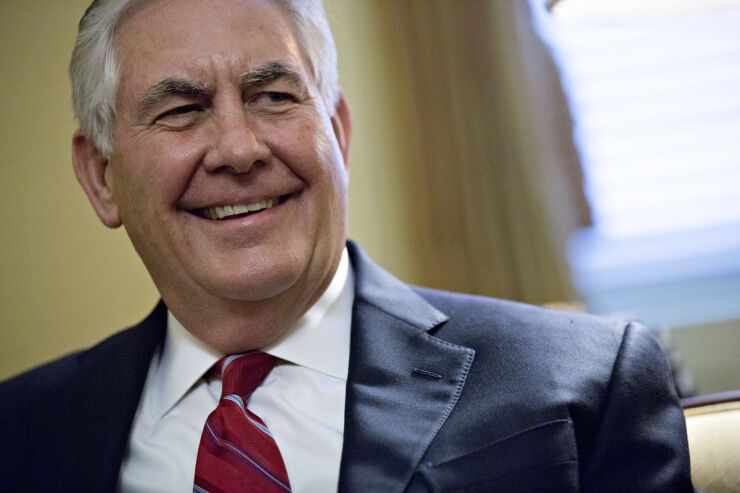Former Exxon Mobil Corp. Chief Executive Officer Rex Tillerson rejected the New York attorney general’s claim that for years he spearheaded a secret scheme to defraud investors by lying about how the oil company planned for the financial risks of climate change.
Tillerson, called as a witness by the state, testified for three and a half hours in Manhattan on Wednesday in the securities-fraud trial. He was CEO during the central event in the case: Exxon’s adoption of a “proxy cost” metric for carbon to predict decreasing demand for oil and gas.
The Texas native, who resigned from Exxon in 2016 to become President Donald Trump’s first Secretary of State, denied that the company’s decade-long proxy-cost system was like a fake “Potemkin village” meant to dupe investors concerned about climate change, as the state claims.

“It was a real system,” Tillerson, 67, said under cross-examination by Exxon’s lawyer, Theodore Wells. “It was robust.”
Tillerson later said he felt bad that so many people at Exxon had been accused of wrongdoing when they had put so much effort into accounting for climate-change risks instead of “putting our heads in the sand.”
“It was the right thing to do,” he said.
New York doesn’t dispute that Exxon uses a conservative proxy cost rising to $80 per ton in 2040 to hedge against risks in its annual outlook for energy pricing. Instead, the state claims Exxon, with Tillerson’s blessing, used a lower metric internally when weighing decisions on financing for individual projects, such as oil sands in Alberta.
But the internal lower metric was a greenhouse gas (GHG) cost, which serves a completely different purpose, Tillerson said under questioning from the state’s lawyer. Using the proxy cost instead of the GHG cost to weigh investments would’ve essentially tricked Exxon into making bad decisions, he said.
“You don’t fool yourself,” Tillerson said.
Exxon argues New York Attorney General Letitia James, who took office in January, is conflating the two metrics to allege a discrepancy where none exists. Tillerson said the differing costs balance the need to both be realistic and not scare the company away from profitable projects.
“There’s always this natural effort underway to make sure we’re doing both,” the former executive said.
New York presented Tillerson with a 2014 email in which two lower-level employees who were discussing proxy costs and GHG costs said “Rex” was happy with the two figures being different, even though reports created for concerned shareholders “implied” they were the same. Tillerson said he didn’t recall being alerted about any such concerns.
The state also showed evidence that Canada’s Imperial Oil, which is majority owned by Exxon and oversees multibillion-dollar oil sands developments, lowered its future GHG-cost forecasts in order to give a rosier picture to the project’s profitability down the road.
Tillerson said that Exxon’s GHG cost, found in a data-guide used across the company, is a “starting point” and that local managers can use their knowledge and discretion when setting GHG costs for projects to calculate expenses. By contrast, he said, the proxy cost is approved by senior management and applied across the board to predict demand.
“The likeliest outcome, in our view, is Exxon agrees to disclose changes in future public filings and pays a nominal sum, but only after years of legal process,” said Brandon Barnes, senior litigation analyst at Bloomberg Intelligence. “New York may have an easier time proving liability given the Martin Act’s breadth, but we think it will be hard for the state to show damages.”
New York Supreme Court Justice Barry Ostrager, who is presiding over the nonjury trial, has repeatedly shown impatience with New York’s case. Last week he said the questioning of one witness was repetitive and “agonizing,” while on Monday he referred to the testimony of another witness as “of absolutely no relevance.”
Exxon will begin calling its own witnesses soon and the trial is set to finish sometime next week.
The case is People of the State of New York v. Exxon Mobil, 452044/2018, New York State Supreme Court (Manhattan).




